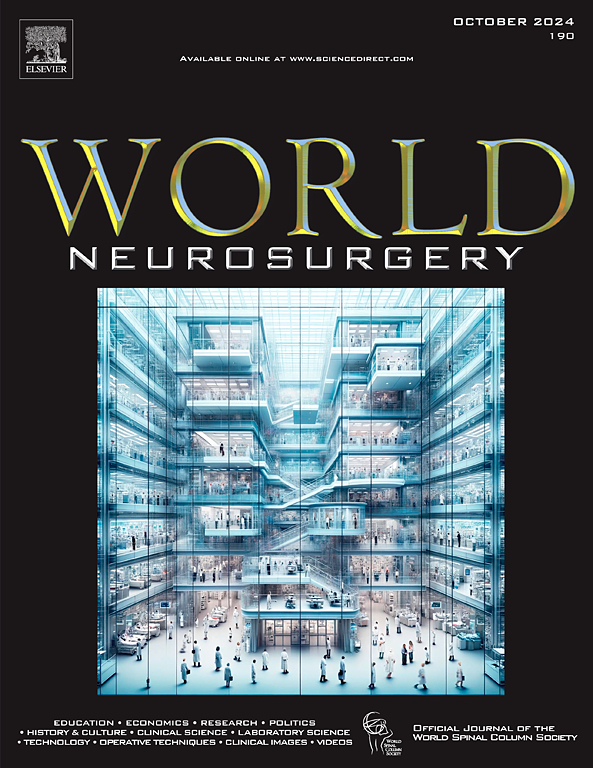The Characteristics of Intracerebral Hemorrhages in Dialysis Patients
IF 1.9
4区 医学
Q3 CLINICAL NEUROLOGY
引用次数: 0
Abstract
Background
Chronic kidney failure is a global public health challenge and is associated with a higher risk of intracerebral hemorrhage (ICH). ICH is known to result in a poorer prognosis in hemodialysis (HD) patients than in non-HD patients.
Methods
This retrospective study examined 445 consecutive cases of ICH to investigate the disparities in outcomes between HD (44 cases) and non-HD (401 cases) patients. The 2 groups were compared based on demographic and clinical factors, and multivariate analyses were performed to identify risk factors for adverse outcomes.
Results
The HD group showed a significantly younger age (68.1 vs. 72.9, P = 0.01) and higher frequencies of hypertension, diabetes, anticoagulant use, a history of smoking, and a history of stroke. Clinical outcomes were worse in the HD group (P < 0.01). Detailed analysis of ICH characteristics revealed a higher rate of hematoma enlargement in the HD group (P < 0.01). Multivariate analysis confirmed dialysis and anticoagulant use as significant risk factors for hematoma enlargement.
Conclusions
The study concludes that HD patients with ICH exhibit a higher risk of hematoma enlargement and poorer clinical outcomes. Dialysis and anticoagulant use emerged as significant risk factors for hematoma enlargement. Larger prospective studies are essential for validating these findings.
透析患者颅内出血的特点。
背景:慢性肾衰竭是一个全球性的公共卫生挑战,并与脑出血的高风险相关。已知脑出血(ICH)导致血液透析(HD)患者的预后比非血液透析患者差。方法:本研究对连续445例脑出血患者进行回顾性研究,探讨HD(44例)与非HD(401例)患者预后的差异。根据人口学和临床因素对两组进行比较,并进行多变量分析以确定不良结局的危险因素。结果:HD组患者年龄明显年轻化(68.1比72.9,p=0.01),高血压、糖尿病、抗凝血药物使用、吸烟史、卒中史发生率较高。结论:HD合并脑出血患者血肿增大的风险较高,临床预后较差。透析和抗凝剂的使用成为血肿扩大的重要危险因素。更大规模的前瞻性研究是验证这些发现的必要条件。
本文章由计算机程序翻译,如有差异,请以英文原文为准。
求助全文
约1分钟内获得全文
求助全文
来源期刊

World neurosurgery
CLINICAL NEUROLOGY-SURGERY
CiteScore
3.90
自引率
15.00%
发文量
1765
审稿时长
47 days
期刊介绍:
World Neurosurgery has an open access mirror journal World Neurosurgery: X, sharing the same aims and scope, editorial team, submission system and rigorous peer review.
The journal''s mission is to:
-To provide a first-class international forum and a 2-way conduit for dialogue that is relevant to neurosurgeons and providers who care for neurosurgery patients. The categories of the exchanged information include clinical and basic science, as well as global information that provide social, political, educational, economic, cultural or societal insights and knowledge that are of significance and relevance to worldwide neurosurgery patient care.
-To act as a primary intellectual catalyst for the stimulation of creativity, the creation of new knowledge, and the enhancement of quality neurosurgical care worldwide.
-To provide a forum for communication that enriches the lives of all neurosurgeons and their colleagues; and, in so doing, enriches the lives of their patients.
Topics to be addressed in World Neurosurgery include: EDUCATION, ECONOMICS, RESEARCH, POLITICS, HISTORY, CULTURE, CLINICAL SCIENCE, LABORATORY SCIENCE, TECHNOLOGY, OPERATIVE TECHNIQUES, CLINICAL IMAGES, VIDEOS
 求助内容:
求助内容: 应助结果提醒方式:
应助结果提醒方式:


